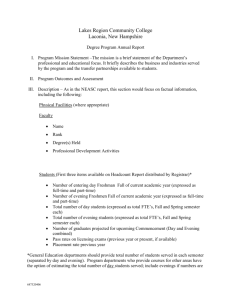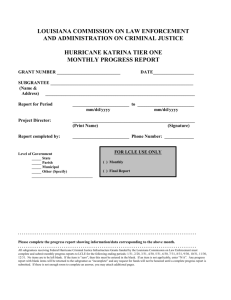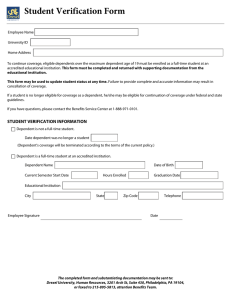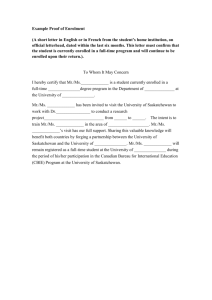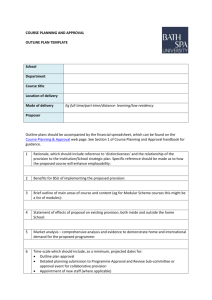Appendix B: Definitions Definition of FTE
advertisement
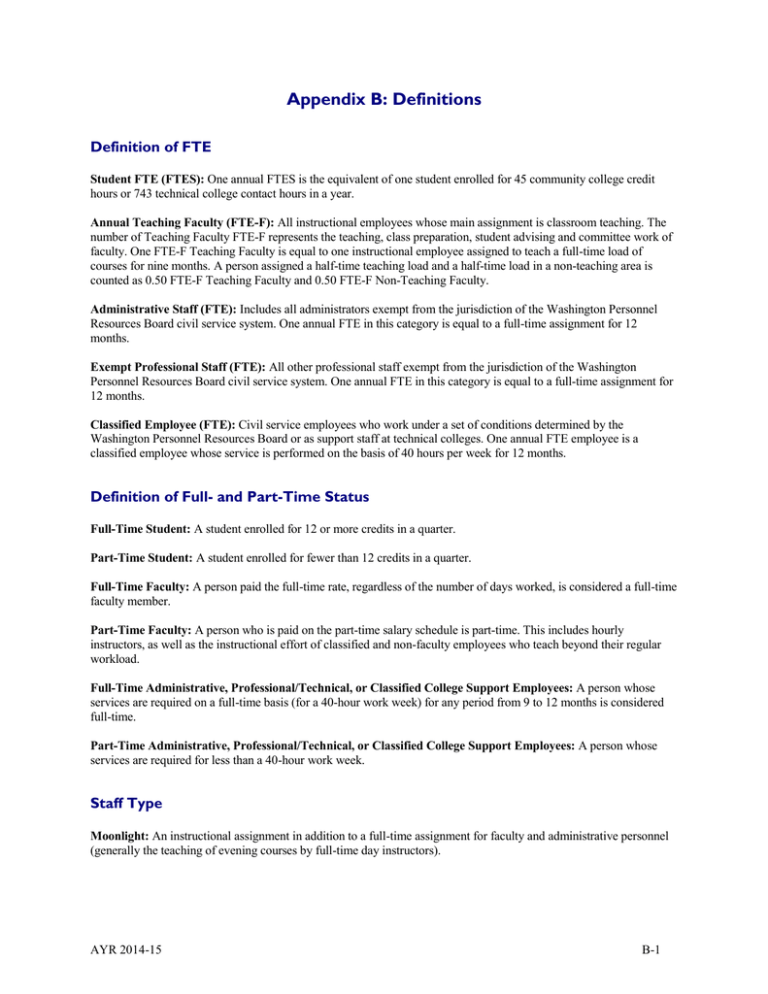
Appendix B: Definitions Definition of FTE Student FTE (FTES): One annual FTES is the equivalent of one student enrolled for 45 community college credit hours or 743 technical college contact hours in a year. Annual Teaching Faculty (FTE-F): All instructional employees whose main assignment is classroom teaching. The number of Teaching Faculty FTE-F represents the teaching, class preparation, student advising and committee work of faculty. One FTE-F Teaching Faculty is equal to one instructional employee assigned to teach a full-time load of courses for nine months. A person assigned a half-time teaching load and a half-time load in a non-teaching area is counted as 0.50 FTE-F Teaching Faculty and 0.50 FTE-F Non-Teaching Faculty. Administrative Staff (FTE): Includes all administrators exempt from the jurisdiction of the Washington Personnel Resources Board civil service system. One annual FTE in this category is equal to a full-time assignment for 12 months. Exempt Professional Staff (FTE): All other professional staff exempt from the jurisdiction of the Washington Personnel Resources Board civil service system. One annual FTE in this category is equal to a full-time assignment for 12 months. Classified Employee (FTE): Civil service employees who work under a set of conditions determined by the Washington Personnel Resources Board or as support staff at technical colleges. One annual FTE employee is a classified employee whose service is performed on the basis of 40 hours per week for 12 months. Definition of Full- and Part-Time Status Full-Time Student: A student enrolled for 12 or more credits in a quarter. Part-Time Student: A student enrolled for fewer than 12 credits in a quarter. Full-Time Faculty: A person paid the full-time rate, regardless of the number of days worked, is considered a full-time faculty member. Part-Time Faculty: A person who is paid on the part-time salary schedule is part-time. This includes hourly instructors, as well as the instructional effort of classified and non-faculty employees who teach beyond their regular workload. Full-Time Administrative, Professional/Technical, or Classified College Support Employees: A person whose services are required on a full-time basis (for a 40-hour work week) for any period from 9 to 12 months is considered full-time. Part-Time Administrative, Professional/Technical, or Classified College Support Employees: A person whose services are required for less than a 40-hour work week. Staff Type Moonlight: An instructional assignment in addition to a full-time assignment for faculty and administrative personnel (generally the teaching of evening courses by full-time day instructors). AYR 2014-15 B-1 Funding Source State-Supported: Courses funded completely or in part by legislative appropriations of state funds plus student tuition. Contract-Funded: Courses funded by grants and contracts with external organizations – includes Running Start and International Contract enrollments. Student-Funded: Courses funded entirely through fees charged to the students enrolled in them. Course Type Academic: Transfer and Workforce Education Support: Courses which provide the first two years of baccalaureate degree programs and which support Workforce Education programs in such areas as math, science, and English. Workforce Education: Courses which prepare students for entry-level employment or provide retraining and upgrading for employed adults. Developmental Studies: Pre-college courses which prepare students for college-level classes. Basic Skills: Courses which enable adults to overcome illiteracy (ABE) or complete high school, or provide English proficiency to those whose native language is not English (ESL). Student Purpose Workforce Education: Students preparing for a new job or upgrading their job skills. Most such students enroll in Workforce Education courses, but some also enroll in pre-college courses and academic support courses. Transfer: Students preparing to transfer to a four-year institution. Most such students enroll in academic courses, but some also enroll in pre-college and Workforce Education courses. Basic Skills as an Immediate Goal: Students enrolled in ABE/ESL/GED preparation or high school completion courses with the goal of gaining basic skills. Students enrolled in such courses with transfer or job-related goals are coded as “Transfer” or “Workforce Education.” Other/Not Specified: Students who have not specified a purpose for their enrollment, who enroll for personal interest, or who enroll for other reasons. Facilities Gross Square Feet - Buildings: The sum of the enclosed floor areas of the building included within the outside faces of exterior walls for all stories. Assignable Square Feet - Buildings: The sum of all areas on all floors of a building assigned to, or available for assignment to, an occupant, including every type of space functionally usable by an occupant (excepting those spaces defined as custodial, circulation, mechanical, and structural areas). AYR 2014-15 B-2 Finance The accounting processes of the community and technical college system are based on generally-accepted governmental accounting principles in accordance with the rules and regulations published by the Office of Financial Management in its Policies and Procedures Manual. The chart of accounts for the community and technical college system is designed to provide consistency in the coding of all funds within the system. Recording of expenditures is achieved through a hierarchical system of funds, programs, and objects. Programs 010 Instruction: This program consists of the formal instructional activities provided for students. 040 Primary Support Services: This program consists of activities providing primary support to instruction. The three major elements are academic computing services, ancillary support services, and academic administration. 050 Libraries: This program consists of activities related to the retention and display of educational materials, including library-media staff and materials, needed to support the learning needs of the students. 060 Student Services: This program consists of social and cultural services and institutional management activities related directly to students, but which are not part of formal instruction. 080 Institutional Support: This program consists of activities related to the financial and overall administrative functions of the college, excluding physical plant operations and maintenance. Included are controller, payroll, administrative data processing, purchasing, community relations, and the top administrators of the college. 090 Plant Operation and Maintenance: This program consists of activities related to the operation and maintenance of college facilities, including utilities, janitorial services, and plant management. Objects A Salaries & Wages Definitions Amounts paid to employees of institutions of higher education. B Employee Benefits Amounts paid as employee benefits. C Personal Services Amounts paid for consulting services rendered by independent contractors. E Goods & Services Amounts expended for all materials and supplies ordinarily consumed or expended within one year, and equipment up to $5,000. G Travel Amounts paid to or for employees for lodging and/or subsistence expenses incurred while traveling on official business. J Capital Outlays The amounts expended for the acquisition of, or addition to, capital assets intended to benefit future periods. Also includes those capital assets acquired through capital leases. N Grants and Subsidies Amounts expended for grants and subsidies received from other governmental units. P Debt Service Amounts expended for the payment of principal, interest, or other charges related to the various forms of indebtedness. S Interagency Reimbursements Payments received from other agencies for services or materials furnished. T Transfers The reallocation of budgeted expenditures within an agency by transfers between programs or funds. AYR 2014-15 B-3
